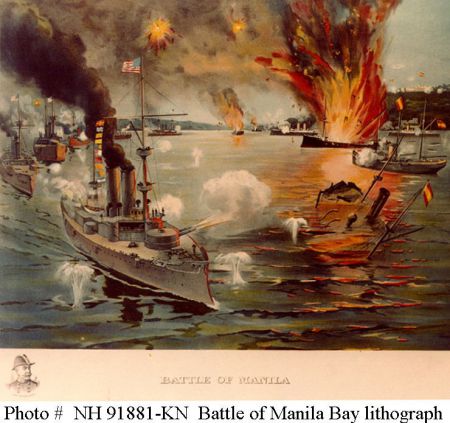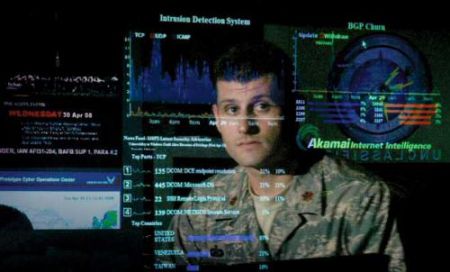STORY posted on November 10, 2010 by Greg Dean
U.S. Cyber Military - Backstop to its global trade war?
Evaluating the cards 'America' does hold ahead of the G20 in Seoul
The United States is risking its status as the (reserve) currency of global trade through the devaluation of the Greenback, which might jump-start domestic employment via the drop of the dollar. If the U.S. can drop the dollar and maintain its reserve currency status, it can create demand from abroad for U.S. products, and hope to keep the calls for (armed) revolution by its politicians and pundits at bay (i.e., Republican candidate Catherine Cabrill, cartoonist Ted Rall, Congressmen Steve King, MSNBC pundit Dylan Ratigan,etc.,). But while the U.S. tries to get its house in order, it’s risking a global trade war; as newly elected Brazilian president pointed out,"The last time there was a series of competitive devaluations, it ended in World War II."
War is always somewhat unbelievable, but I think the U.S. has given signals, if obscured ones, that it has new, more subtle ways to wage, what would otherwise be, unpopular global war. More subtle war-fare techniques from a new submarine class that’s designed to cut undersea communications cables, and probably has cut a few lines to the Middle East (1), to it’s incredible investment in cyber warfare, to being able to knock out all electro-magnetic devices in a region. The Washington Post is reporting that the Pentagon’ Cyber Command is requesting permission to expand its battlefield to what General Keith B. Alexander has called “the full spectrum” of offensive cyber space operations.(2)
With the U.S. running a capital accounts deficit, a military deficit and a trade deficit, the U.S. can’t pay the massive debts it owes to the world. So what is left for the U.S. to do? 1. It can turn the U.S. dollar into a pariah currency to allow its financial titans to buy out the assets of other country’. 2. The Yanks can use their military assets to destroy competitors’ output so the U.S. can regain trade hegemony in real, domestically produced goods and commodities (if it’s corporate ‘elite’ are at all interested in the domestic economy of the U.S. and not just their own pockets).
This destruction of competing economies’ output capacity, would then allow the U.S. to replace that supply with its own goods. Only now, because there’s scarcity (from destroying global productivity), U.S. firms get higher prices filling that supply.
While the world economy is a very global one, which means elites’ interests cross borders and cultures, there has still been a lot of xenophobia and protectionism, especially in Germany and the U.S. against the Chinese. Through the Committee on Foreign Investment, the U.S. (CFIUS) has continually blocked certain purchases by the Chinese of U.S. companies.(3) Because U.S. dollars can’t even be used to buy assets in the U.S., China, especially in the last month, has negotiated direct currency swaps with almost a dozen countries now. This means a significant portion of global trade has recently been shifted away from the U.S. dollar. South America is set within its continental trade to go through BancoSur, and many latin American countries have direct bilateral trade arrangements with China. Also working hard to bypass the U.S. dollar are Iran, Russia, Turkey, most of East Asia, and China probably also has some direct trade arrangements in the works to bypass the U.S. dollar in many parts of Africa, where the Chinese have been busy building massive infrastructure projects all over Africa on very favourable terms to African regimes.
Canada will probably suffer the most immediate and significant effects of the devaluation of the U.S. dollar to attract more manufacturing jobs to USamerica and to enable U.S. banks more capital to buy up foreign assets for free. First we’ll lose more manufacturing jobs to the U.S., second with Canadians freely accepting U.S. dollars for natural resources, our assets will get bought up and will result in value (profit) created in Canada never staying in the country. Canada has traditionally had one of the worst capital accounts (profits staying in the country), and I predict that will worsen rapidly.
With incredibly sophisticated cyber attacks on Iranian gas and nuclear plants through a popular Siemens (German) control system, the industrial world, from China to Brazil, Russia to the Middle East are very much on-guard. But because these countries won’t accept the U.S. debt and may well stop accepting U.S. financiers from buying up their currencies, real-estate, etc., the ‘international community’ should indeed be braced for attacks on the digital controls of their economies.
In order to rob other countries blind, as I saw in SE Asia during the paper tiger crisis of 1998-1999, the U.S. requires everyone else to lay their assets open to “free-market exchange” and then creates money so American banks can buy others’ assets for, essentially, free. The U.S. then prevents purchases of it’s enterprises by many investors, especially those from China, as we’ve seen with the CFIUS. Basically there are seas of U.S. Dollar that are worthless to all too much of the world; more than worthless, they are threatening high inflation in much of the world. Much of the world in one way or another is stopping the acceptance of U.S. dollars as we speak. They’re going to try and do it quietly and politely so as to minimize the shocks to global trade, but one thing is certain, the U.S. dollar is openly considered a pariah currency now. It’s probably unraveling somewhat faster than many of us observers had expected.
Many will point to the fact that U.S. T-bills are at all time yield lows, ‘so clearly there is still demand and faith in U.S. credit’ the argument will go. But I think much of this demand has been jury-rigged: The Federal Reserve and the Treasury maybe fraudulently sending in ‘buyers’ to the bond auctions - buyers who they create and license – then create credit, either off-book credit, or credit through its colluding banks in probably both Britain and the U.S (5). These made-up auction purchasers would use the money which was created for them to use, so that the auctions for U.S. bonds can maintain the appearance of having competitive appetite for American debt. Basically the U.S. establishment is fraudulently buying its own bonds to keep debt payments down.
With much of the world no longer accepting a raiding army in the form of dollars, the U.S. won’t be able to continue it’s free lunch, and will soon have to compete fairly, vying to sell what goods it has on the global market just like everyone else. Without being able to swindle through finance slight-of-hand, or be the arbiter of big international merger & acquisition deals (fallen to 2nd place, down %41 the first part of 2010 from a year earlier(4)), the U.S. likely descends to a living standard it hasn’t known since its Civil War. In order to keep this slide from happening, it has only a couple of options. The U.S. probably won’t find much success in sending its president groveling to India, Indonesia, etc., trying to get them to accept the American I Owe Yous. China, Brazil, Japan and Columbia are already putting rules in place to prevent their banks from exchanging the U.S. QE2 “hot money” into their economy. So the old hypocrisy isn’t playing too well, even amongst two of America’s biggest allies – Japan and Columbia. With option #1 out for them, I think we’ll see the Yanks resort to attacking the productive assets of other countries, in order to cripple competitors’ output and create global market shortages. When there are shortages prices go up, so U.S. domestic companies can get higher prices while filling those shortages, and enable themselves to finance the re-stoking of manufacturing States’ side.
As we just saw in India, with 75,000 jobs created from one arms deal; creating geo-political conflict is the biggest single thing keeping the U.S. domestic economy going and the one sector that those in Washington D.C. can politically agree to support.
The problem with any attempt to repatriate goods production States’ side is that the U.S. is tearing itself apart: It can’t even agree to lower its own production costs as we saw in the health care debate and even that minimal achievement to control production (labour) costs is being clawed back via the ‘Obamacare’ campaign.
Now that the U.S. is economic hit-man non-grata, we could see cyber attacks and attacks on electronic communications of other economies so that the U.S. doesn’t have to compete for global market share. ‘Revive some of the same advantage we had as the only remaining industrial out-putter after WWII’, could well be the thinking that will allow support for pre-emptive cyber warfare to gain real traction within the American establishment. This would be extremely dangerous thinking and would likely result in a global war. Does the U.S. have the chutzpah to really think it can control the perils of stepping onto such a precipice? Luckily for the rest of the world, the American elite are too busy infighting to really leverage their one remaining card - military might – into boosting a diverse economy at home. But macro dollar and military policy coming out of the executive branches are sure going to give such a booster shot a try, rest of the world be damned.
Quite the stage the U.S. has set for itself at the G20 Korea Summit in Seoul. We’ll see if Seoul doesn’t prove to be the opening-salvo of much deeper global conflict.
(1)Bruce Shneier. Fourth Undersea Cable Failure in Middle East. Shneier on Security (February 2008). http://www.schneier.com/blog/archives/2008/02/fourth_undersea.html (retrieved November 2008) (1)Note: almost all of the good articles published on this that I was reading in 2008 during the last cut in service telecoms service to the Middle East are no longer online, including one article which documented a camera on the Egyptian shore pointing out to sea that showed no ships at anchor over the area of the telecom cable.
(2) Nakashima, Ellen. Pentagon’s Cyber Command seeks authority to expand its battlefield. Washington Post. November 6th, 2010. http://www.washingtonpost.com/wp-dyn/content/article/2010/11/05/AR2010110507304.html (retrieved November 2010)
(3) Pradhan, Jaya Prakash. Different Shades of American Protectionism. Munich Personal RePEc Archive, July 2009. http://mpra.ub.uni-muenchen.de/16004/1/MPRA_paper_16004.pdf . (Retrieved Nov. 2010)
(4) Chris Martenson. ‘The Shell Game Continues’. The Marenson Report (April, 2010). http://www.chrismartenson.com/martensonreport/shell-game-continued?page=0 (Retrieved Nov. 2010)
(5) Miller, Don. U.S. Loses Crown as King of M&A to Emerging Markets. Money Morning (March 2010). http://moneymorning.com/2010/03/23/ma-emerging-markets/. (Retrieved November 2010).
The site for the Vancouver local of The Media Co-op has been archived and will no longer be updated. Please visit the main Media Co-op website to learn more about the organization.


Comments
Interesting read, thanks. <a
Interesting read, thanks. <a href="http://myforces.ca">Canadian Forces Social Network</a>